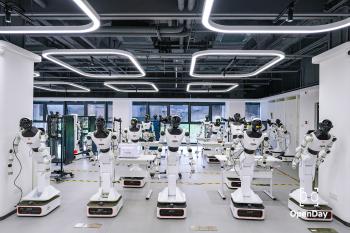Trumpf invests in Quside, joins Qutac consortium
25.01.2023 - Lining up with the Quantum Technology & Application Consortium’s twelve existing members and tapping the market for random number generators of around € 10 B expected by 2026.
“With the high-tech company Trumpf, we’re welcoming yet another highly innovative German company to Qutac. We stand to be enriched by their experience in applying quantum computing to essential areas such as machine tools, networked manufacturing, and laser technology,” says Jörn Messner, chairman of the Qutac executive committee and CEO of Lufthansa Industry Solutions. “This will bring us one step closer to an economically successful quantum computing ecosystem, as well as to digital sovereignty for Germany and Europe.”
Trumpf will initially be active in Qutac’s production and logistics and quantum systems working groups. The applications the Ditzingen-based company will develop will focus on optimizing machine occupancy on the production floor, image processing via machine learning, and how quantum computing can be harnessed to accelerate machine learning. Trumpf is also researching how to use quantum computing to simulate heat input during laser cutting and how it can improve production equipment automation.
“Quantum computing is one of the key technologies for enhancing Germany’s position as a business location. Joining the consortium means we are maintaining our commitment in this area and we’re ready to contribute to making quantum computing usable for a variety of industries,” says Frederick Struckmeier, responsible for quantum computing applications at Trumpf.
At the same time, Trumpf Venture is making a multimillion euro investment in the Spanish startup Quside. The company’s core product is a high-performance random number generator located in a photonic chip. Using the quantum mechanical properties of light, it produces completely random number combinations very quickly – in the Gb/s range. This makes it possible to improve the encryption of messages enormously. It can also be used to perform simulations such as risk analyses in the financial sector or weather forecasts much faster and with far greater energy-efficiency.
The chip is compatible with common semiconductor manufacturing (CMOS), which enables easy mass production. Quside is based in Castelldefels near Barcelona and currently employs around thirty people. Founded in 2018, the startup’s first customers are from sectors with high security requirements, such as aerospace. The company plans to expand into the consumer market in the coming years, to use chips to increase the security of smartphones, tablets or even vehicles.
Quside’s chip enables the encryption of messages that even computationally powerful quantum computers cannot decrypt. Currently, there is already a great demand in industries where security plays a major role. In the coming years, the technology could also play an increasingly important role in private devices. In 2026, the market of random number generators is expected to be between around seven and ten billion euros worldwide, depending on the forecast.
In addition to encryption, Quside’s random number generator also enables a faster and more energy-efficient calculation of simulations. This means, for example, that traffic forecasts can be calculated up to ten times faster. Energy consumption is up to twenty times lower. Such simulations are also used by the insurance industry, the logistics sector and the pharmaceutical industry.
Contact
QUTAC – Quantum Technology & Application Consortium
Berlin
Germany
030 2089 870 43
QUSIDE TECHNOLOGIES, S.L.
Carrer Esteve Terradas, número 1, Oficina 304
08860 Castelldefels (Barcelona)
Spain








